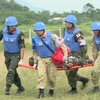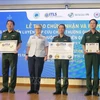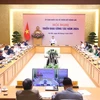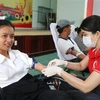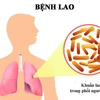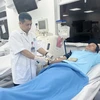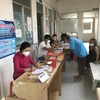The Expanded Programme on Immunisation (EPI) has reached all Vietnamese children, becoming one of the most important humanitarian achievements of Vietnam’s health sector that has received international recognition.
At a tele-conference on the EPI in Hanoi on August 2, Dr. Kohei Toda from the World Health Organisation (WHO) in Vietnam said that after 30 years, the programme has provided protection for around 67 million children in Vietnam through free vaccination against free against 11 diseases, including tuberculosis, diphtheria, tetanus, polio and measles.
It was reported at the conference that thanks to the EPI Vietnam has eradicated smallpox, polio and tetanus. The incidence of measles among children has dropped from hundreds of thousands of cases before 1985 to several dozens at present. The rate of hepatitis B virus infection in children was also reduced to 2 percent in 2010.
Vietnam has also become able to produce 10 out of the 11 types of vaccines used in the EPI, meeting more than 70 percent of the programme’s vaccine need.
Vaccines for other diseases like parotitis, rubella, and avian influenza type H5N1 and H1N1 are being developed and tested.
However, experts said the EPI is facing new challenges when foreign assistance for the field is reducing. In particular, a number of deaths after vaccinations are also causing concerns.
EPI reports show that among 11 kinds of vaccines given to 1.7 million Vietnamese children every year, the vaccine Quinvaxem and Hepatitis B have been recognised as causing the most infant fatalities.
Most recently, three children in central Quang Tri province died after being given hepatitis B vaccinations at Huong Hoa District Hospital on July 20.
The health ministry has ordered suspension of this vaccine and send the related batches of vaccine abroad for safety checks.
In recent years, the Health Ministry has issued a safe immunisation procedure and tightened vaccine control.-VNA
At a tele-conference on the EPI in Hanoi on August 2, Dr. Kohei Toda from the World Health Organisation (WHO) in Vietnam said that after 30 years, the programme has provided protection for around 67 million children in Vietnam through free vaccination against free against 11 diseases, including tuberculosis, diphtheria, tetanus, polio and measles.
It was reported at the conference that thanks to the EPI Vietnam has eradicated smallpox, polio and tetanus. The incidence of measles among children has dropped from hundreds of thousands of cases before 1985 to several dozens at present. The rate of hepatitis B virus infection in children was also reduced to 2 percent in 2010.
Vietnam has also become able to produce 10 out of the 11 types of vaccines used in the EPI, meeting more than 70 percent of the programme’s vaccine need.
Vaccines for other diseases like parotitis, rubella, and avian influenza type H5N1 and H1N1 are being developed and tested.
However, experts said the EPI is facing new challenges when foreign assistance for the field is reducing. In particular, a number of deaths after vaccinations are also causing concerns.
EPI reports show that among 11 kinds of vaccines given to 1.7 million Vietnamese children every year, the vaccine Quinvaxem and Hepatitis B have been recognised as causing the most infant fatalities.
Most recently, three children in central Quang Tri province died after being given hepatitis B vaccinations at Huong Hoa District Hospital on July 20.
The health ministry has ordered suspension of this vaccine and send the related batches of vaccine abroad for safety checks.
In recent years, the Health Ministry has issued a safe immunisation procedure and tightened vaccine control.-VNA





